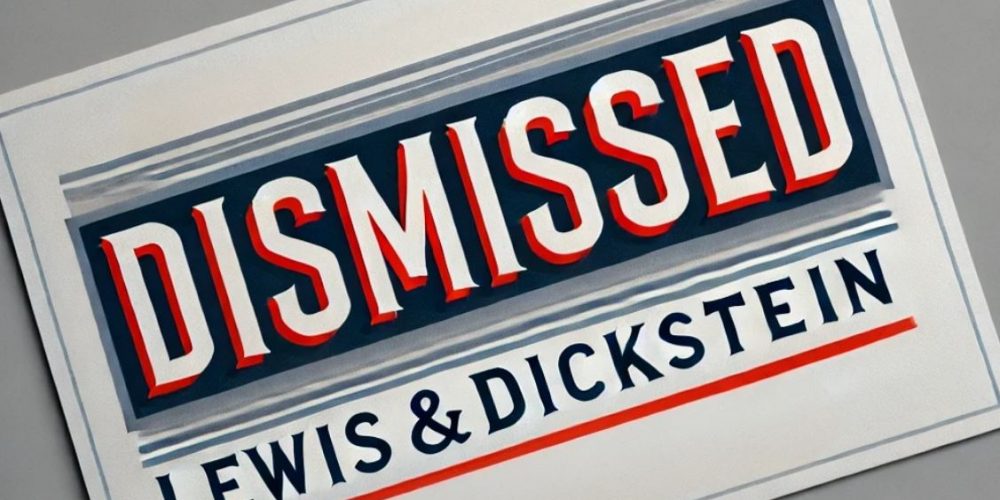Case Dismissed!
A preliminary examination is a hearing where the prosecution must present evidence proving by a preponderance of the evidence that the defendant committed a felony.

The Criminal Defense Attorneys at Lewis & Dickstein, P.L.L.C. win again!
This week, LEWIS & DICKSTEIN, P.L.L.C. secured a complete dismissal of a felony assault case in an Oakland County district court. The Team at LEWIS & DICKSTEIN, P.L.L.C. handled the case and won the dismissal at the preliminary exam in a historic victory that exonerated the client and saved him from having to defend himself at trial in Oakland County Circuit Court.
Background
The firm’s client (here called Clint) was accused of pointing a pistol at his wife’s brother (here called Lyle), thereby committing the crime of felonious assault. In reality, the event began with a verbal argument, Lyle punched Clint in the face, and Clint legally drew his firearm and pointed it at Lyle in self-defense. Clint then went to his car, secured the weapon, and called the police to report the assault.
When sheriff’s deputies arrived, Clint and Lyle, each wrote statements. Clint did not want to cause further family drama, so he signed a waiver telling police that he did not want to see Lyle prosecuted. Lyle, however, indicated that he did want Clint prosecuted. Despite being the victim, the police arrested Clint, and the county prosecutor brought a felony charge against him that could have subjected him to up to four years in prison.
Clint knew he was in serious trouble. He needed someone to fight for him. He called LEWIS & DICKSTEIN, P.L.L.C., and our mission was to win the client’s preliminary exam. Many defense lawyers believe getting a dismissal after a preliminary exam is impossible; our attorneys believe it is essential, if possible.
What is a Preliminary Exam?
In Michigan, felony cases always begin in district courts. At the district court, a defendant has a right to a preliminary exam. The purpose of the exam is to force the prosecution to show probable cause to believe the defendant committed a felony. Probable cause means enough evidence to cause a regular person to entertain a reasonable belief of the defendant’s guilt. Winning at a preliminary exam is not easy because it is a low standard of proof, and prosecutors rarely have trouble meeting it. If probable cause exists, the case is bound over to the circuit court for trial. An exam is a hearing, something like a mini-trial, where the prosecutor calls witnesses to testify. From the defense perspective, to win at a preliminary exam requires a showing that a crime was likely not committed or that the defendant did not commit the offense.
For various reasons, defendants often waive their right to the exam. When the prosecution and defense hold preliminary exams in district courts, the district court judge almost always finds probable cause. An exam is almost perfunctory because the prosecutor previously approved the charges. The standard for issuing a warrant is also probable cause. Those determinations alone suggest to many judges that probable cause already exists. Demonstrating that it does not, therefore, require an extraordinary amount of effort and skill. That is the challenge to win at a defendant’s preliminary exam.

Winning Clint’s Preliminary Exam
Here, the defendant maintained his innocence. He was legally justified in drawing his weapon because Lyle punched him. Clint did not want to take a plea. He wanted a preliminary exam. He wanted justice.
As the hearing began, the county prosecutor called Lyle to the stand. The judge placed him under oath. Lyle stated that Clint had come to the house, and the two began arguing about a family matter. He said that unprovoked; Clint pulled out his pistol and pointed it at Lyle’s head. The prosecutor ended direct examination, stating that she had established probable cause for Clint committing a felonious assault on Lyle.
In order to win at a preliminary exam, a Defense attorney must be able to find the discrepancies in a witnesses testimony. The Defense attorneys from LEWIS & DICKSTEIN, P.L.L.C. took the opportunity to cross-examine Lyle. They pointed to several inconsistencies in the police report. For example, the report stated that Lyle told one deputy Clint pointed the firearm only once and that Lyle told another deputy Clint pointed the gun twice. Lyle insisted that he only said Clint pointed the pistol once and stated when prompted that the other deputy must have been lying if he wrote in the police report that Lyle said “twice.”
The skillful defense team then asked Lyle if he would ever hit someone. Lyle denied that he would. Unknowingly, Lyle had just opened the door to the introduction of character evidence by claiming that his character was such that he would not hit someone. The team at LEWIS & DICKSTEIN, P.L.L.C. did their homework and were prepared and knew Lyle had recently faced assault and battery charges for punching another person. When examined on the stand, Lyle admitted that he had hit that man but denied ever hitting Clint.
Then the team from LEWIS & DICKSTEIN, P.L.L.C. sealed the deal. Lyle was asked if having a gun pointed at him was a big deal, something that would profoundly affect a person. Lyle agreed. Lyle was then handed a copy of his written statement and asked him to direct the court to a reference to a gun. Lyle could not because he never mentioned the gun in his written statement! Lyle was pressed and asked if had forgotten to write about the gun because he was too busy lying about hitting Clint. Lyle angrily denied this, but his credibility was already in tatters and our client was on his way to winning at his preliminary exam.

The Ruling
The district court judge had a determination to make. In nearly every case where the defense raises a factual dispute at the exam, district court judges bind the matter over to circuit court because questions of fact are best left for trial. The district court judge does not need to believe the evidence beyond a reasonable doubt to find probable cause, and judges almost always find probable cause. To win at preliminary exam is a rare experience for many defense lawyers, but not for the team with LEWIS & DICKSTEIN, P.L.L.C.
The judge here ruled that no probable cause existed. For the first time in her 20-year tenure on the bench, she found a witness so lacking in credibility that she could not reasonably believe that Clint was guilty. Without Clint ever opening his mouth in court, Clint’s defense attorney proved his innocence and Clint won at the preliminary exam hearing.

Lawyers Who Will Fight to Win a Preliminary Examination
The dedicated, experienced, and zealous criminal defense attorneys at LEWIS & DICKSTEIN, P.L.L.C. fight for their clients at every step of every case when handling felony and misdemeanor charges in federal court or state courts in Oakland, Macomb, Wayne, Washtenaw, and Livingston Counties and throughout Michigan. Even when it seems insurmountable – like winning at preliminary exam – the team at LEWIS & DICKSTEIN, P.L.L.C. will accomplish the extraordinary. The Defense Team at LEWIS & DICKSTEIN, P.L.L.C. have a well-earned reputation for providing the highest quality defense and aggressive representation, making prosecutors defend the charges they bring against our clients. Call us for a free consultation.
Call us today at (248) 263-6800 for a free consultation or complete an online Request for Assistance Form. We will contact you promptly and find a way to help you.













